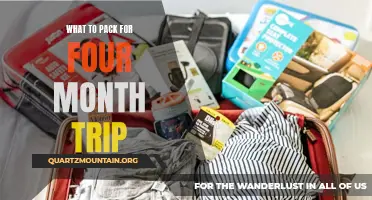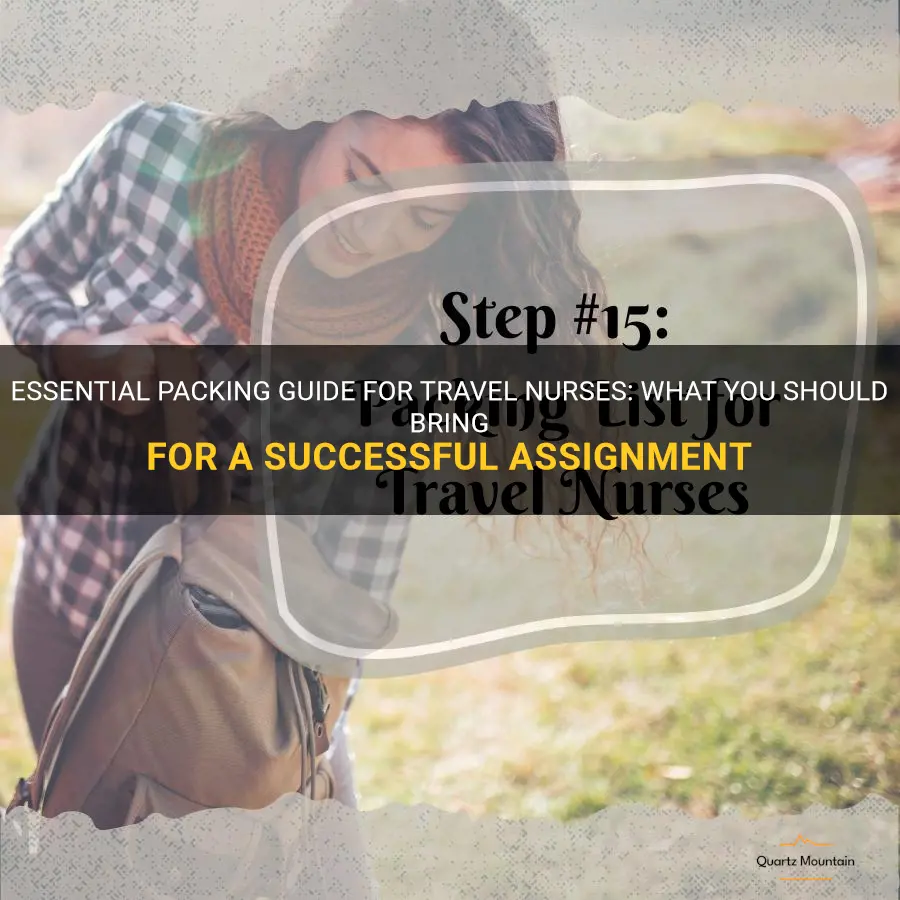
Are you a travel nurse preparing for your next assignment? As exciting as it may be, the thought of packing for a new location can be overwhelming. But fear not! Our essential packing guide for travel nurses is here to help you bring everything you need for a successful assignment. From practical items to personal comforts, we'll cover all the essentials to ensure you're prepared and comfortable wherever your nursing journey takes you. So grab your suitcase and let's dive in!
| Characteristics | Values |
|---|---|
| Clothing | - Enough outfits for the duration of the assignment - Comfortable shoes for walking and standing - Weather-appropriate clothing for the destination |
| Personal Items | - Toiletries (toothbrush, toothpaste, shampoo, etc.) - Medications - Glasses/contact lenses - Phone charger |
| Documentation | - Nursing license - Certifications - Identification (passport, driver's license) - Medical records (if applicable) |
| Electronics | - Laptop/tablet - Charging cables - Headphones - Camera (optional) |
| Work Supplies | - Stethoscope - Penlight - Scrubs - Badge/relevant identification |
| Miscellaneous | - Travel-sized laundry detergent - Snacks - Water bottle - Travel pillow - Travel-sized first aid kit |
What You'll Learn
- What essential medical supplies should a travel nurse pack when going on assignment?
- How many sets of clothes should a travel nurse bring for a typical assignment?
- Are there any specific documents or certifications that a travel nurse should pack when traveling for an assignment?
- What types of personal items should a travel nurse consider packing for their comfort and well-being during an assignment?
- Are there any specific weather-related items that a travel nurse should pack based on the location of their assignment?

What essential medical supplies should a travel nurse pack when going on assignment?
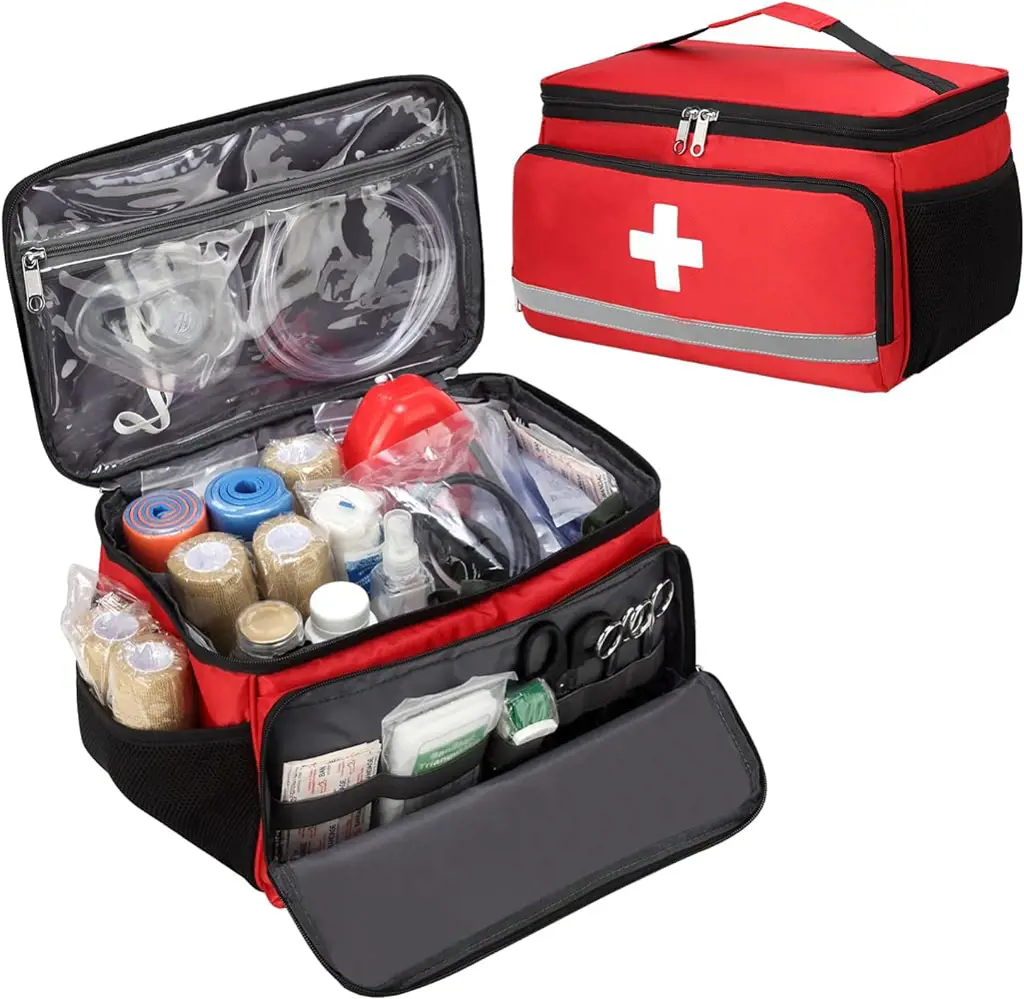
As a travel nurse, it is crucial to be prepared for any medical situation that may arise during your assignment. Packing essential medical supplies can ensure that you can provide quality care to your patients, even in a new and unfamiliar setting. Here are some must-have medical supplies to consider packing:
- Basic first aid supplies: This includes items such as adhesive bandages, gauze pads, medical tape, and antiseptic wipes. These supplies can come in handy for minor injuries or wound care.
- Medications: It is important to carry a supply of common over-the-counter medications such as pain relievers, antihistamines, and antacids. Additionally, if you have any personal prescription medications, make sure to pack an adequate supply to last the duration of your assignment.
- Personal Protective Equipment (PPE): In the current times of the COVID-19 pandemic, PPE is more important than ever. Make sure to pack an ample supply of face masks, gloves, and hand sanitizers to protect yourself and your patients.
- Diagnostic tools: While most healthcare facilities will provide the necessary diagnostic equipment, having a few essential tools can be helpful. A stethoscope, blood pressure cuff, and thermometer are portable and can assist you in performing basic assessments.
- Wound care supplies: It is essential to have an assortment of wound care supplies, including sterile gloves, wound cleansers, sterile dressings, and adhesive strips. These supplies will enable you to provide immediate care for wounds and maintain good infection control practices.
- IV supplies: If you have experience with IV therapy, it may be convenient to bring a basic IV start kit, including catheters, IV fluids, and administration sets. However, check with your travel agency and the facility you will be working at to ensure you can safely and legally perform IV therapy.
- Personal hygiene items: Don't overlook personal hygiene items such as hand lotion, lip balm, and sunscreen. These supplies can help you stay comfortable and protected during your shifts.
- Reference materials: As a travel nurse, you may find yourself in unfamiliar clinical settings. Packing reference materials such as drug guides, pocket-sized medical dictionaries, and clinical guidelines can help ensure that you have access to the necessary information when needed.
Remember to check with your travel agency and the healthcare facility you will be working at regarding their requirements and policies on personal medical supplies. Some facilities may provide certain supplies, while others may have specific regulations in place.
In summary, as a travel nurse, it is important to pack essential medical supplies to be prepared for any medical situation that may arise during your assignment. By including items such as first aid supplies, medications, PPE, diagnostic tools, wound care supplies, IV supplies (if applicable), personal hygiene items, and reference materials, you can ensure that you can provide quality care to your patients no matter where your assignment takes you.
Essential Items to Pack for a Trip to Banff: Your Complete Packing Guide
You may want to see also

How many sets of clothes should a travel nurse bring for a typical assignment?
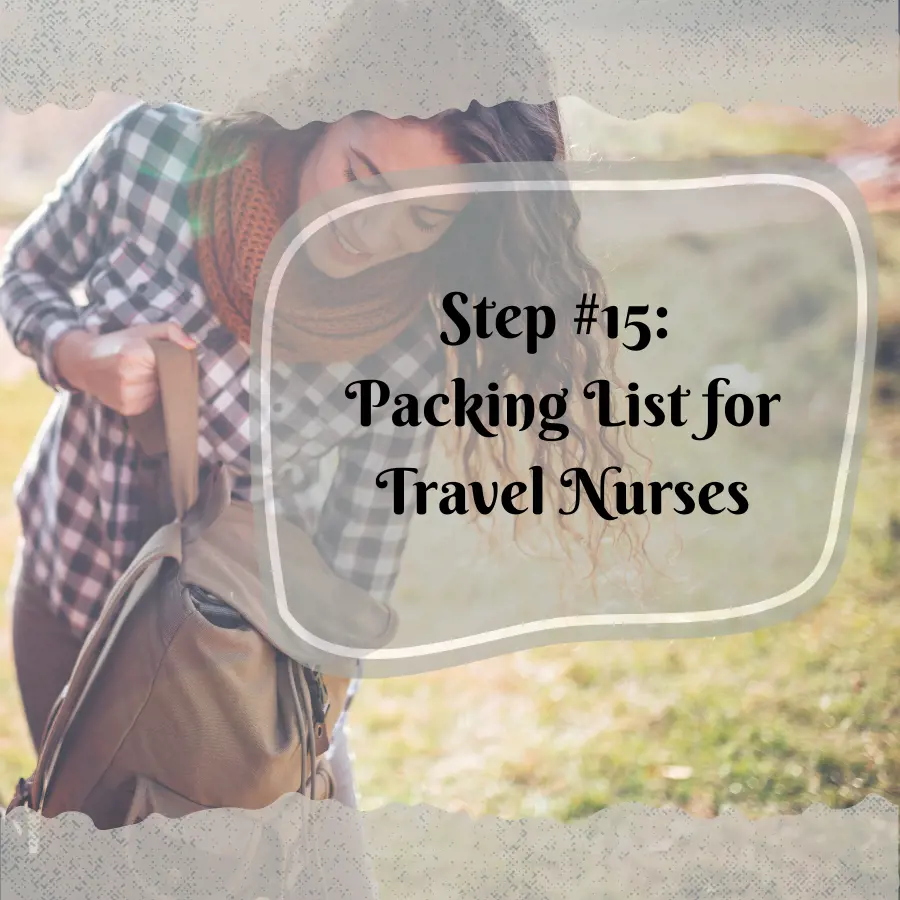
When embarking on a travel nursing assignment, it's important to consider how many sets of clothes you should bring with you. As a travel nurse, you'll likely be on the move frequently, working long hours, and staying in various locations. Having enough clothes that are both practical and comfortable will ensure you're prepared for any situation that may arise during your assignment.
There are several factors to consider when deciding how many sets of clothes to bring. These include the length of your assignment, the climate of your destination, and the laundry facilities available to you.
First, consider the length of your assignment. If you're only going to be on location for a few weeks, it may be sufficient to pack enough clothes for a week or two. This will allow you to rotate through your outfits without wearing the same thing every day. However, if your assignment is several months long, you may want to pack enough clothes to last you a month or more. This will give you more options and allow you to go longer between laundry days.
Next, think about the climate of your destination. If you're heading to a warmer climate, you'll likely want to pack more lightweight and breathable clothing. This will ensure you stay cool and comfortable throughout your assignment. On the other hand, if you're going to a colder climate, you'll need to pack heavier clothing such as sweaters, coats, and boots. Be sure to also pack layers, as the weather may change during your assignment.
Another important consideration is the laundry facilities available to you. If you're staying in an extended-stay hotel or an apartment with a washer and dryer, you'll have more flexibility with your clothing choices. However, if you're staying in a hotel or other location without laundry facilities, you may need to pack more clothes or plan to do laundry at a laundromat. It's also a good idea to pack some travel-size laundry detergent and stain removers in case you need to spot clean your clothes.
Additionally, it's important to consider the type of work you'll be doing as a travel nurse. If you'll be working in a hospital setting, you'll likely need to adhere to a specific dress code. Be sure to pack enough scrubs or other appropriate attire for your shifts. You may also want to pack some casual clothes for your time off.
To help you determine exactly how many sets of clothes to pack, consider creating a capsule wardrobe. This involves selecting a few versatile pieces of clothing that can be mixed and matched to create multiple outfits. By packing a few key items, such as a pair of jeans, a skirt or dress, a few tops, and a jacket or sweater, you can create a variety of different looks without bringing an excessive amount of clothing.
In conclusion, the number of sets of clothes a travel nurse should bring for a typical assignment depends on the length of the assignment, the climate of the destination, and the availability of laundry facilities. It's important to pack enough clothes to last you for the duration of your assignment, while also considering the practicality and comfort of your clothing choices. By taking into account these factors and creating a versatile capsule wardrobe, you'll be well-prepared for your travel nursing adventure.
The Essential Items to Pack in Your Changing Bag
You may want to see also

Are there any specific documents or certifications that a travel nurse should pack when traveling for an assignment?

When traveling for a travel nursing assignment, it is important to bring along certain documents and certifications to ensure a smooth transition and work experience. These documents and certifications will not only help verify your qualifications but also ensure you meet the necessary requirements set by the healthcare facility you will be working in. Here are some specific documents and certifications that a travel nurse should pack:
Nursing License:
Your nursing license is the most important document you should bring with you when traveling for a nursing assignment. This license is issued by the state you are registered in and verifies your qualification to practice nursing. Make sure your license is up to date and valid for the duration of your assignment.
Certifications and Specializations:
If you have any additional certifications or specializations, such as ACLS (Advanced Cardiac Life Support) or PALS (Pediatric Advanced Life Support), bring the corresponding certificates with you. These certifications demonstrate your advanced skills and can increase your chances of being hired for certain positions.
Immunization Records:
Most healthcare facilities require proof of immunization before you can start working. Make sure to bring a copy of your immunization records, including vaccines for diseases such as hepatitis B, influenza, and tetanus. It is also a good idea to bring proof of any recent tuberculosis (TB) testing you have undergone.
Resume and References:
Even though you may have already submitted your resume and references during the application process, it is always a good idea to have additional copies with you. These documents can come in handy if your new employer wants an updated resume or if you need to provide references to acquire additional certifications.
Skills Checklist and Competency Assessments:
Some healthcare facilities may require you to complete a skills checklist or competency assessment to ensure you are proficient in certain areas. These assessments are typically completed before the start of your assignment and ensure you are qualified to provide care in specific settings, such as an intensive care unit or emergency room. Make sure to bring any completed assessments or paperwork related to these requirements.
Background Check and Drug Screening Results:
Many healthcare facilities require a background check and drug screening as part of their hiring process. If you have already completed these screenings, make sure to bring copies of the results with you. It is also a good idea to have a list of any prescribed medications you are currently taking to avoid any confusion with drug screenings.
Personal Identification and Insurance Cards:
Don't forget to bring your driver's license or other government-issued identification cards. These will be essential for traveling and for verifying your identity when you arrive at your assignment location. Additionally, bring copies of your health insurance and any other relevant insurance cards.
Remember, it is always a good idea to make multiple copies of the documents mentioned above and keep them in a safe place. You never know when you might need to present these documents, and having backups can save you time and stress. As a travel nurse, it is crucial to be prepared and organized, as it will ensure a smooth and successful assignment.
Essential Items for a Memorable Trip to Israel: Your Ultimate Packing Guide
You may want to see also

What types of personal items should a travel nurse consider packing for their comfort and well-being during an assignment?
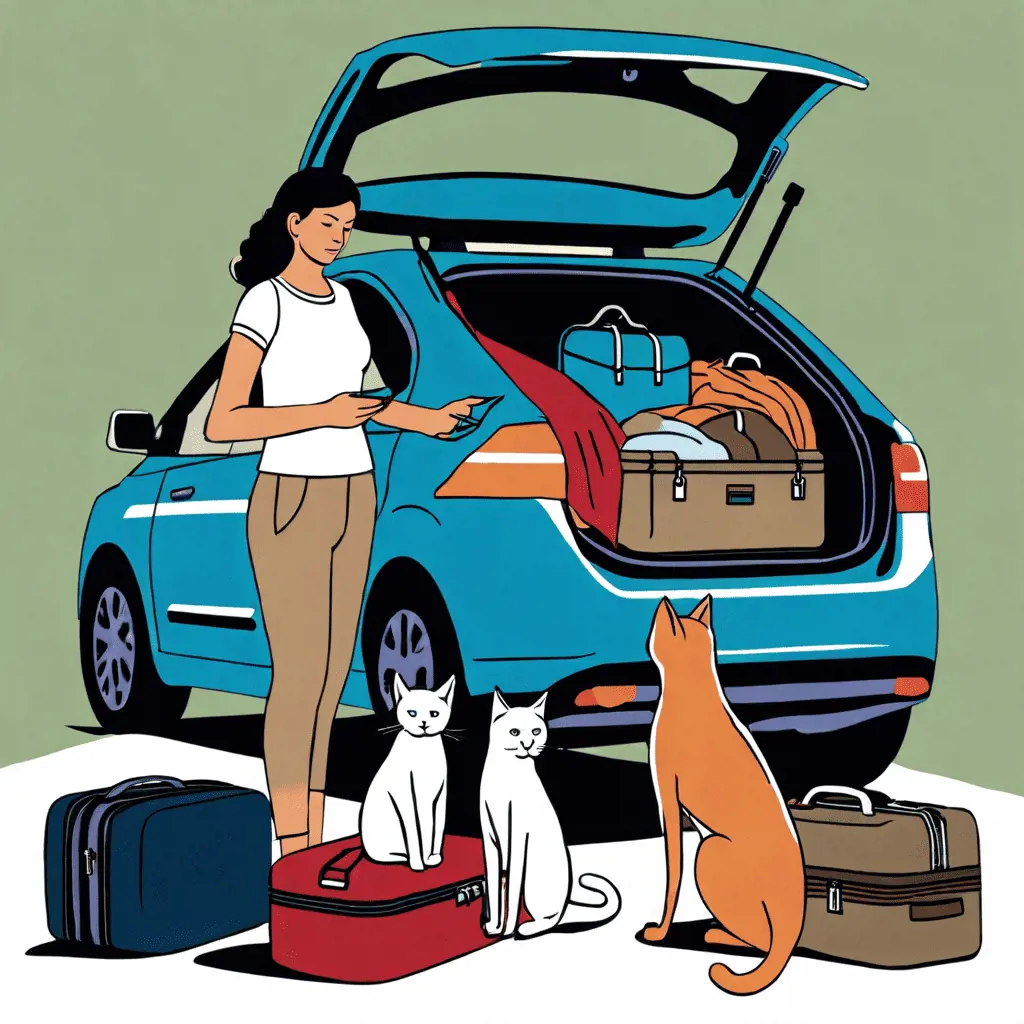
When it comes to packing for a travel nursing assignment, there are a few personal items that can greatly enhance your comfort and well-being during your time away from home. Here are some essential items to consider including in your travel nurse packing list.
- Comfortable Clothing: Packing comfortable clothing is essential for travel nurses, as they spend long hours on their feet and need to be able to move freely. Opt for breathable and stretchy fabrics that allow for ease of movement. Comfortable shoes are also a must, as walking and standing for extended periods can take a toll on your feet and legs.
- Bedding: Bringing your own bedding, such as a familiar pillow, sheets, and blankets, can help create a sense of familiarity and comfort in your temporary living space. Additionally, some travel nurses may prefer to invest in a travel-sized mattress topper or air mattress to enhance the comfort of their sleeping arrangements.
- Toiletries: It is important to bring your own toiletries to ensure you have the products you are most comfortable using. This includes items such as your preferred shampoo, conditioner, body wash, and skincare products. If you have any specific medications or personal care items, be sure to pack an ample supply to last you throughout your assignment.
- Entertainment: A travel nursing assignment can be mentally and emotionally demanding, so having some form of entertainment can help you relax and unwind during your downtime. Consider bringing books, magazines, a tablet, or a portable gaming device to keep yourself entertained during breaks and evenings.
- Electronics: In today's digital age, having access to your electronics is essential. Be sure to bring your smartphone, laptop, or any other devices you use regularly. Additionally, pack the necessary chargers and adapters to ensure you can keep your devices powered up.
- Exercise Equipment: Staying active and exercising regularly is important for physical and mental well-being. Depending on your preferences, consider packing exercise equipment such as resistance bands, a yoga mat, or a jump rope. These items are compact and can easily be incorporated into your travel nurse lifestyle.
- Kitchen Essentials: If you enjoy cooking, it can be beneficial to pack some basic kitchen essentials. This may include a small set of pots and pans, utensils, a cutting board, and some preferred spices or condiments. Having these items on hand allows you to prepare your own meals and maintain a healthier diet while on assignment.
- Personal Mementos: Lastly, don't forget to pack a few personal mementos that hold sentimental value to you. This could be a family photo, a favorite piece of jewelry, or a small piece of artwork. These items can help create a sense of familiarity and remind you of home during your time away.
While it is important to pack these personal items, be mindful of the restrictions and limitations of your travel nurse accommodations. Some housing arrangements may have limited space or may already provide certain essentials. Make sure to communicate with your agency or housing provider to ensure you are only packing what is necessary and allowed.
In conclusion, when packing for a travel nursing assignment, it is crucial to consider personal items that can enhance your comfort and well-being. From comfortable clothing and bedding to entertainment and exercise equipment, these items can make your time away from home more enjoyable. Be sure to personalize your packing list based on your preferences and needs, and don't forget to stay organized throughout your travel nurse journey.
Essential Items to Pack for a Month in Sri Lanka
You may want to see also

Are there any specific weather-related items that a travel nurse should pack based on the location of their assignment?
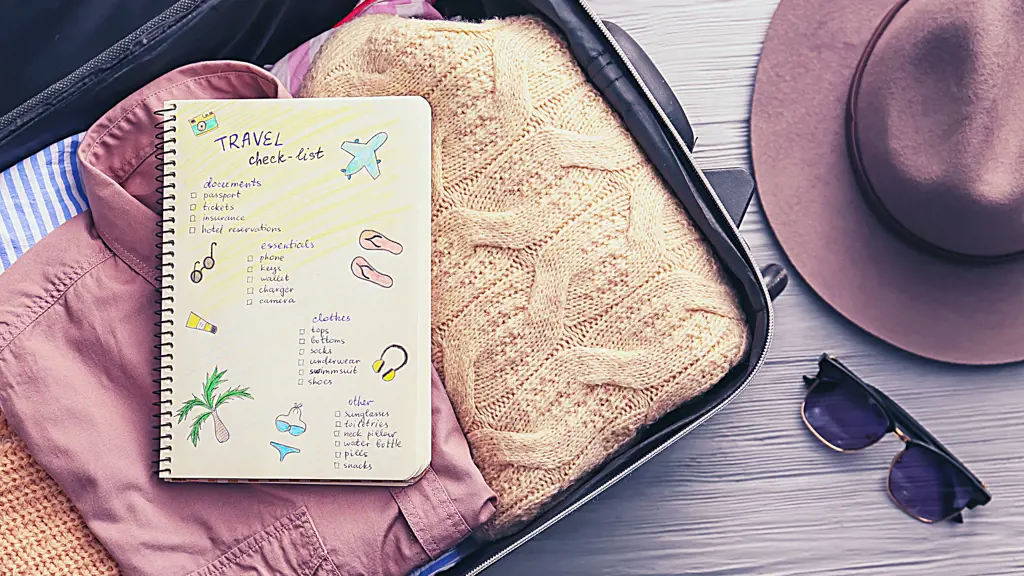
As a travel nurse, you may find yourself moving to various locations across the country. The weather at your assignment location can greatly impact your experience and daily life. Therefore, it is essential to pack the appropriate weather-related items to ensure your comfort and safety during your time there.
To determine which weather-related items are necessary for your assignment location, it is important to research and understand the climate and weather patterns of that particular region. Here are a few key items to consider based on different weather conditions:
Cold and Snowy Climates:
If your assignment takes you to a region with cold and snowy winters, you should pack items such as thermal clothing, heavy-duty winter boots, hats, gloves, scarves, and a heavy winter coat. It is also advisable to bring an ice scraper for your car and a portable shovel for any snow removal needs. Additionally, adding hand and foot warmers to your packing list can be beneficial if you have to spend extended periods in cold outdoor environments.
Hot and Humid Climates:
For travel nurses heading to locations with hot and humid summers, it is vital to pack lightweight and breathable clothing, such as light-colored cotton or linen shirts, shorts, and skirts. Additionally, investing in a high-quality sunscreen with a high SPF is essential to protect your skin from harmful UV rays. Don't forget to pack a wide-brimmed hat and sunglasses to shield your face and eyes from the sun. Staying hydrated is crucial in hot climates, so don't forget to pack a reusable water bottle to ensure you have access to clean drinking water at all times.
Rainy Climates:
If your next assignment is in an area known for frequent rainfall, it is wise to pack a reliable rain jacket or waterproof coat. Having a sturdy and compact travel-sized umbrella in your bag can also come in handy during unexpected rain showers. Waterproof shoes or boots with good traction are essential to keep your feet dry and prevent slips and falls on wet surfaces.
Coastal or Tropical Climates:
If you are heading to a coastal or tropical location, it is essential to protect yourself from mosquitoes and other insects. Pack insect repellent with DEET to ward off bugs during your outdoor activities. Additionally, consider bringing a lightweight and breathable mosquito net to use at night if needed. A good quality swimsuit is also a must for coastal locations, and don't forget your snorkel gear if you're in a prime location for underwater exploration.
High Altitude Environments:
Travel nurses who are assigned to locations at high altitudes, such as mountainous regions, should take precautions to acclimate to the thinner air. It is advisable to pack warm clothing, as temperatures tend to drop significantly at higher altitudes. Additionally, bringing a water bottle to stay hydrated and over-the-counter medications for altitude sickness can be beneficial.
While these items provide a general guideline, it is always advisable to research the specific weather patterns and conditions of your assignment location. This will help you pack accordingly and ensure you have a comfortable and enjoyable experience as a travel nurse. Don't forget to double-check your packing list before leaving to make sure you have everything you need to face the local weather with confidence.
Essential Packing Guide for an Unforgettable Visit to Six Flags San Antonio
You may want to see also
Frequently asked questions
When packing for travel nursing, it is important to consider the length of your assignment and the climate of your destination. Essentials include clothing that is versatile and appropriate for different weather conditions, comfortable shoes for long shifts, a stethoscope and other necessary medical equipment, toiletries, and any personal items that will make your living space feel like home. Additionally, it is always a good idea to bring important documents, such as your nursing license and credentials, in case they are needed during your assignment.
Packing snacks and food can be a good idea when you are travel nursing, especially if you are going to an area where the availability of your preferred foods may be limited. Bringing some non-perishable snacks, like granola bars or trail mix, can be a lifesaver during long shifts or when you don't have time to grab a meal. You may also want to bring any specific dietary items or ingredients that you prefer, especially if you have dietary restrictions or preferences. However, it is important to keep in mind any regulations or restrictions on bringing food when traveling, especially if you are crossing borders.
When packing for travel nursing, it is important to be organized and efficient. Start by making a list of the essentials you will need for your assignment and gather them together in one place. Separate your clothing by type and consider using packing cubes or compression bags to save space and keep things organized. Use a sturdy suitcase or duffel bag that is easy to transport and consider investing in packing accessories like packing cubes or garment bags to keep your belongings tidy during transit. Remember to pack any necessary medications or medical supplies in an easily accessible place and consider labeling your bags with your name and contact information in case they are misplaced.







